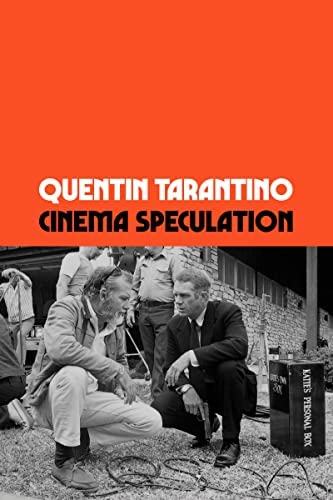 By QUENTIN TARANTINO (Harper; 2022)
By QUENTIN TARANTINO (Harper; 2022)
In late 2019 Quentin Tarantino commenced posting movie reviews on the New Beverly Cinema website, only to abruptly take them down a few months later. The reason for the suppression, it turns out, is this book, into which many of those online reviews have been encompassed.
Tarantino’s write-ups, most of them reviews of movies released during the 1970s (his formative decade), are enormously passionate and opinionated, weaving in snatches of history (his own and that of the filmmakers) and, as the title portends, speculation. They’re enormously fun to read, with an impressive breadth of knowledge and a highly quirky layout—Tarantino is quite partial to excessive italics and single sentence (and sometimes single word) paragraphs. For the full effect you’ll have to read Tarantino’s self-edited, Wayback Machine-preserved online reviews, with their questionable grammar (he tends to confuse “have” with “of,” “its” with it’s” and vice-versa) and casual profanity (as in a reference to “some fuckwad in the cinema”), but the cleaned-up versions contained in CINEMA SPECULATION nonetheless satisfied this purist.
The book begins with an essay: “Little Q Watching Big Movies,” in which Tarantino details the roots of his obsession with all things filmic. As a child his single mother and her significant others would take “Little Q” to adult-oriented movies like JOE, MASH, AIRPLANE and THE GODFATHER, with the highlight being an early 1970s double feature of THE BUS IS COMING and the Jim Brown starrer BLACK GUNN, viewed in the company of a raucous all-black audience at the Carson Twin Cinemas in Carson, CA (identifying theatrical venues is quite important to Tarantino, and the Carson Twin is one of the most frequently mentioned examples).
This remembrance is bookended by the final chapter, a “Floyd Footnote” in which Tarantino fills in the particulars of a frequently mentioned figure from his early years. Floyd was a black man who hung out with Tarantino’s mother in the late 1970s and, despite a highly mercurial and unpredictable nature, inspired the teenaged Tarantino with his boundless enthusiasm for movies, and also a never-filmed screenplay Floyd wrote about a black gunslinger that apparently had a sizeable influence on DJANGO UNCHAINED.
Of the reviews, BULLITT is touted as “one of the best directed movies ever made,” DELIVERANCE as having a good first half that then “dribbles to its conclusion,” ROLLING THUNDER as “the best combination of character study and action film ever made,” and ESCAPE FROM ALCATRAZ as “(director Don) Siegel’s most expressive film.” In nearly all cases the reviews are spiced with quotes from interviews conducted by Tarantino with Walter Hill, John Milius and Paul Schrader, as well as dissertations on subjects ranging from Steve McQueen’s enterprising ex-wife Neile to the 1965 Japanese prison escape classic ABASHIRI BANGAICHI, and a scolding of writer-director Paul Schrader for bowing to studio pressure on his 1979 film HARDCORE—and so “giving the same spineless excuse a lot of directors of fiascoes claim after the fact, the big bad studio made me.”
Also included are dissertations on “New Hollywood” in the seventies, former LOS ANGELES TIMES film critic Kevin Thomas (“he seemed like one of the only practitioners who truly enjoyed their job, and consequently their life”), and longtime Tarantino idol Brian De Palma, who was once slated to direct TAXI DRIVER, a possibility that inspires an essay called “What If Brian De Palma Directed TAXI DRIVER Instead of Martin Scorsese?” For the record, Tarantino believes De Palma would have turned out a clinical REPULSION-esque treatment quite different from the expressionistic thriller delivered by Scorsese.
To sum up, the writings contained in CINEMA SPECUALTION are much like Quentin Tarantino’s movies: amusing, outrageous, audience-friendly and filled with quotable lines. Wordage like “It would be amazing to see Stallone direct another movie with the passion he had when he made PARADISE ALLEY. It would be amazing to see Stallone love something again the way he loved PARADISE ALLEY,” probably won’t impact the public consciousness in the manner of Tarantino dialogue like “I’m gonna get medieval on your ass,” but it should.
